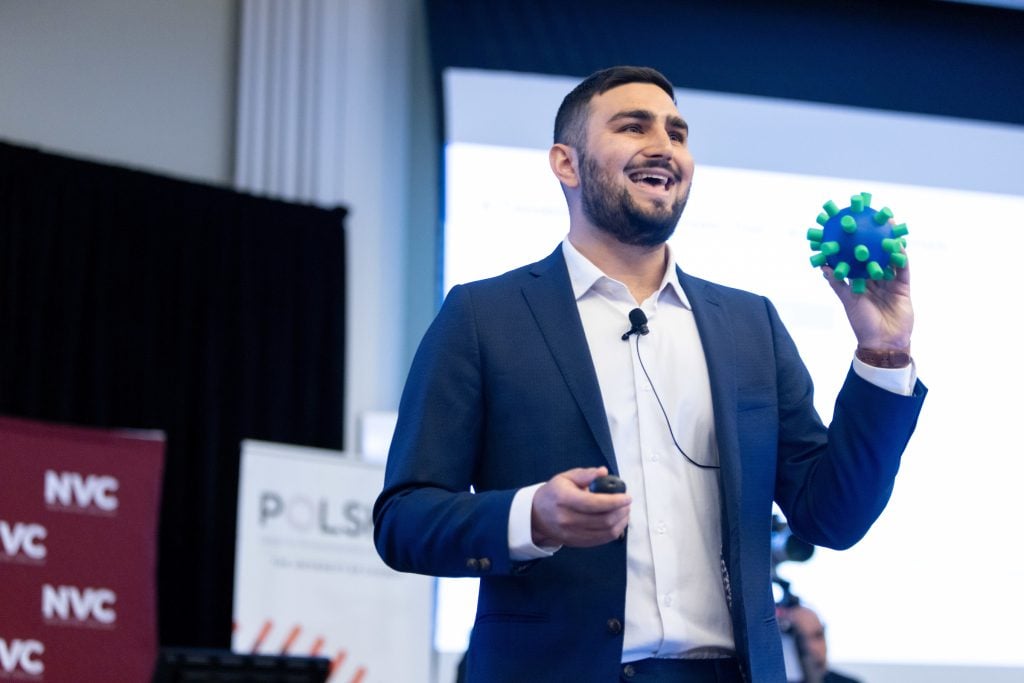Alnair Therapeutics Follows Polsky Path to String of Impressive Wins, $1M+ Funding Round

Alnair cofounder and CBO, Ryan Meyers, explains some of the science behind Alnair’s innovations at the 2023 Edward L. Kaplan New Venture Challenge. (Photo by Anne Ryan)
Momentum continues to build for Alnair Therapeutics, an oncology startup focused on developing a platform to better deliver drugs to hard-to-treat cancers.
In June – the same month that the company won the 27th Annual Edward L. Kaplan, ’71, New Venture Challenge (NVC) – it announced the closing of an oversubscribed $1+ million pre-seed funding round.
“Things have happened really fast,” said Anh Ngyuen, MBA ’11, cofounder and CEO of the company. “We just reincorporated last fall and have been privileged to win both the 2023 NVC pitch competition and the George Schultz Innovation Fund (GSIF) 2022 fall cohort award, and now we have closed our pre-seed round in two weeks. We’re really achieving what we need to jumpstart a new company.”
The genesis of the company lies in research conducted by Xiaoyang Wu, associate professor of cancer research and stem cell biology at the University of Chicago. Wu cofounded Alnair and serves as its chief science officer.
Wu’s innovation leverages a well-known metabolic feature of cancer known as the “Warburg effect” to better target tumors and deliver drugs at effective levels. The first-in-class drug delivery platform is designed to work with many of today’s treatments, including oncolytic, targeted, immune and hormone therapies.
Pre-clinical studies of the technology in animal models have shown significant increases in tumor targeting and drug penetration, resulting in improved patient survival. In triple negative breast cancer, for instance, it resulted in rates of survival 3.5 times versus conventional therapy.
Wu, who won the Duckworth Family Commercial Promise Award and Ullman Family Team Science Award for his research, came to the Polsky Center to explore the potential commercial applications of his technology.
He participated in both the Compass deep tech accelerator and Polsky I-Corps programs to vet the viability of turning his innovation into a successful business venture and to develop the structure and foundations of the startup.
It’s here that he met core partners Nguyen and Ryan Meyers, MBA ’23, cofounder and chief business officer, and was introduced to a network of advisors to guide the company in every aspect of commercialization, from pre-clinical trials to business operations and manufacturing to fundraising.

Alnair Therapeutics team at the 2023 NVC Finals. Left to right: Chicago Booth professor Mark Tebbe, Xiaoyang Wu, Ryan Meyers, Cristen Bublitz, Flavio Pacheco, Andrew Warmus, Anh Nguyen, Guillermo Baca, and Chicago Booth professor Steve Kaplan. (Photo by Anne Ryan)
With a strong team in place, the startup then became eligible to compete in the GSIF, where they tied for first place and received $175,000 in funding. Meyers then led a winning student team that included Cristen Bublitz, MBA ’24, Guillermo Baca, MBA ’25, and Flavio Pacheco, JD/MBA ’25 in the NVC pitch competition, through which the startup received a $585,000 investment.
“The Polsky Center has laid out a series of steps that we followed from ideation to early formation,” said Meyers. “The team that we have and what we’ve been able to accomplish is really a product of the momentum that the University of Chicago and its network can build for startups with promise.”
Closing the pre-seed round capped off the company’s series of early-stage wins. Investors in the round include Portal Innovations, OCA Ventures, Gaingels, and CJM Ventures. The pre-seed also included a strong group of angel investors. The startup plans to use the funding for pre-clinical studies aimed at de-risking the translatability of the technology.
With the pre-seed under its belt, Alnair has immediately moved into fundraising for its seed round, with a goal of raising $10 million to move the studies into human trials. It’s the next step in a journey that the company has been able to reach in part because of the guidance it has received from the Polsky Center.
“We are all very grateful to the Polsky Center for the multiple programs they offer to help faculty translate their discoveries from bench to bedside,” said Wu. “We think this technology has the potential to positively impact a lot of lives and we’re excited to be closer to bringing it to those in need.”